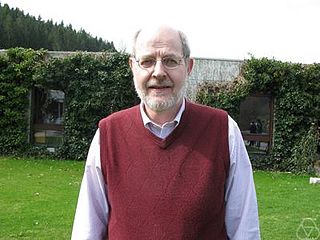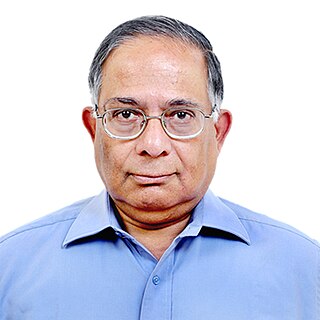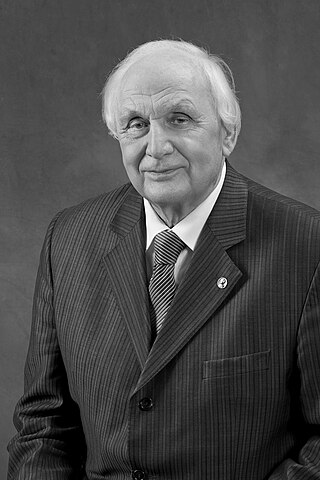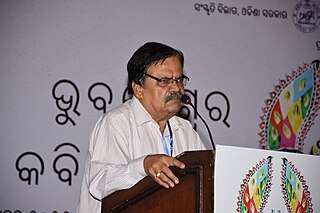Related Research Articles

Calyampudi Radhakrishna Rao,, commonly known as C. R. Rao, is an Indian-American mathematician and statistician. He is currently professor emeritus at Pennsylvania State University and Research Professor at the University at Buffalo. Rao has been honoured by numerous colloquia, honorary degrees, and festschrifts and was awarded the US National Medal of Science in 2002. The American Statistical Association has described him as "a living legend whose work has influenced not just statistics, but has had far reaching implications for fields as varied as economics, genetics, anthropology, geology, national planning, demography, biometry, and medicine." The Times of India listed Rao as one of the top 10 Indian scientists of all time. In 2023, Rao was awarded the International Prize in Statistics, an award often touted as the "statistics’ equivalent of the Nobel Prize". Rao is also a Senior Policy and Statistics advisor for the Indian Heart Association non-profit focused on raising South Asian cardiovascular disease awareness.

Mathai Varghese is a mathematician at the University of Adelaide. His first most influential contribution is the Mathai–Quillen formalism, which he formulated together with Daniel Quillen, and which has since found applications in index theory and topological quantum field theory. He was appointed a full professor in 2006. He was appointed Director of the Institute for Geometry and its Applications in 2009. In 2011, he was elected a Fellow of the Australian Academy of Science. In 2013, he was appointed the Elder Professor of Mathematics at the University of Adelaide, and was elected a Fellow of the Royal Society of South Australia. In 2017, he was awarded an ARC Australian Laureate Fellowship. In 2021, he was awarded the prestigious Hannan Medal and Lecture from the Australian Academy of Science, recognizing an outstanding career in Mathematics. In 2021, he was also awarded the prestigious George Szekeres Medal which is the Australian Mathematical Society’s most prestigious medal, recognising research achievement and an outstanding record of promoting and supporting the discipline.
Prabhu Lal Bhatnagar, commonly addressed as P. L. Bhatnagar, was an Indian mathematician known for his contribution to the Bhatnagar–Gross–Krook operator used in Lattice Boltzmann methods (LBM).

Sambalpur University is a public research university located in Burla town, of district Sambalpur, India, in the state of Odisha. Popularly known as Jyoti Vihar, it offers courses at the undergraduate and post-graduate levels. The governor of Odisha is the chancellor of the university. The campus is located 15 km away from Sambalpur.

Ronald George Douglas was an American mathematician, best known for his work on operator theory and operator algebras.
Satya Atluri is an American engineer, educator, researcher and scientist in aerospace engineering, mechanical engineering and computational sciences, who is currently the Presidential Chair & University Distinguished Professor at Texas Tech University. Since 1966, he made fundamental contributions to the development of finite element methods, boundary element methods, Meshless Local Petrov-Galerkin (MLPG) methods, Fragile Points Methods (FPM), Local Variational Iteration Methods, for general problems of engineering, solid mechanics, fluid dynamics, heat transfer, flexoelectricity, ferromagnetics, gradient and nonlocal theories, nonlinear dynamics, shell theories, micromechanics of materials, structural integrity and damage tolerance, Orbital mechanics, Astrodynamics, etc.

Kalyan Bidhan Sinha is an Indian mathematician. He is a professor at the Jawaharlal Nehru Centre for Advanced Scientific Research, and Professor Emeritus for life of the Indian Statistical Institute.

B. V. Rajarama Bhat is an Indian mathematician specialising in operator theory. He is a Professor of Mathematics in Indian Statistical Institute, Bangalore.

Messoud Efendiev is an Azerbaijani scientist. He was born in Zaqatala, Azerbaijan.
Ádám Korányi is a Hungarian and American mathematician. He is a Distinguished Professor of Mathematics and Computer Science at Lehman College, City University of New York and at the CUNY Graduate Center. His research interests include complex analysis, harmonic analysis, and quasiconformal mappings.
Vivek Shripad Borkar is an Indian electrical engineer, mathematician and an Institute chair professor at the Indian Institute of Technology, Mumbai. He is known for introducing analytical paradigm in stochastic optimal control processes and is an elected fellow of all the three major Indian science academies viz. the Indian Academy of Sciences, Indian National Science Academy and the National Academy of Sciences, India. He also holds elected fellowships of The World Academy of Sciences, Institute of Electrical and Electronics Engineers, Indian National Academy of Engineering and the American Mathematical Society. The Council of Scientific and Industrial Research, the apex agency of the Government of India for scientific research, awarded him the Shanti Swarup Bhatnagar Prize for Science and Technology, one of the highest Indian science awards for his contributions to Engineering Sciences in 1992. He received the TWAS Prize of the World Academy of Sciences in 2009.

Volodymyr Koshmanenko — Ukrainian mathematician, Doctor of Science, professor, Leading Researcher of the Institute of Mathematics of the NAS of Ukraine.
Vern Ival Paulsen is an American mathematician, focusing in operator theory, operator algebras, frame theory, C*-algebras, and quantum information theory.
Rahul Pandit is an Indian condensed matter physicist, a professor of physics and a divisional chair at the Indian Institute of Science. Known for his research on phase transitions and spatiotemporal chaos and turbulence, Pandit is an elected fellow of Indian Academy of Sciences, Indian National Science Academy and The World Academy of Sciences. The Council of Scientific and Industrial Research, the apex agency of the Government of India for scientific research, awarded him the Shanti Swarup Bhatnagar Prize for Science and Technology, one of the highest Indian science awards, for his contributions to physical sciences in 2001.
Odisha Bigyan Academy is a non-profit organisation in the Indian state of Odisha. It was established by professors and academics in science and technology to popularize scientific ideas and technological innovations among students and general public along with encouraging scientific research activities in the State under one umbrella. It encourages students to pursue science as a career and academics to excel in the field of science and engineering research.

Vladimir Aleksandrovich Ilyin was a Soviet and Russian mathematician, Professor at Moscow State University, Doctor of Science, Academician of the Russian Academy of Sciences who made significant contributions to the theory of differential equations, the spectral theory of differential operators, and mathematical modeling.

Baidyanath Misra was an Indian economist, educationist, author, and administrator from the state of Odisha. He served as the Vice-Chancellor of the Odisha University of Agriculture and Technology, Deputy-Chairman of Odisha State Planning Board, Chairman of Odisha's First State Finance Commission, Secretary of Odisha State Welfare Board, founder Secretary and President of Orissa Economics Association, and the founder Director and Chairman of Nabakrushna Choudhury Centre for Development Studies. He wrote 16 books in English and 20 in Odia. He was also a columnist in several leading Odia journals and newspapers. He organised several camps across Odisha, for helping the cause of the poor and downtrodden.

Soubhagya Kumar Misra in an Indian poet and writer from Odisha. The Sahitya Akademi India's National Academy of Letters, awarded him the Sahitya Akademi Award in 1986. He is a recipient of Gangadhar National Award (2013).
Saket Saurabh is an Indian Computer Scientist who is currently the Professor of Theoretical Computer Science at the Institute of Mathematical Sciences, Chennai (IMSc), India and an adjunct faculty at University of Bergen, Norway. He specializes in parameterized complexity, exact algorithms, graph algorithms and game theory. His fundamental contributions to the area of parameterized complexity include procedures for obtaining algorithmic lower bounds, and meta-theorems on preprocessing. Saket Saurabh was awarded the Shanti Swarup Bhatnagar Prize for Science and Technology in Mathematical Sciences in the year 2021.

Mohammad Sal Moslehian. is an Iranian mathematician and a professor of mathematics at Ferdowsi University of Mashhad, Iran. He is the President of the Iranian Mathematical Society for the period of 2021-2024 and an invited member of the Iranian Academy of Sciences. His Erdős number is 3. He is known for his contribution to the operator and norm inequality. He has developed the orthogonality in Hilbert C*-modules and has significant contributions to operator means. He established noncommutative versions of martingale and maximum inequalities that play an essential role in noncommutative probability spaces. In addition, he has written several expository papers discussing research and education, as well as promoting mathematics.
References
- ↑ "Gadadhar Misra | Homepage".
- ↑ "Indian Fellow: Professor Gadadhar Misra". Indian National Science Academy. Archived from the original on 6 February 2015. Retrieved 26 June 2013.
- ↑ Gadadhar Misra at the Mathematics Genealogy Project
- ↑ Click here [ permanent dead link ] for Professor Misra's MathSciNet page.